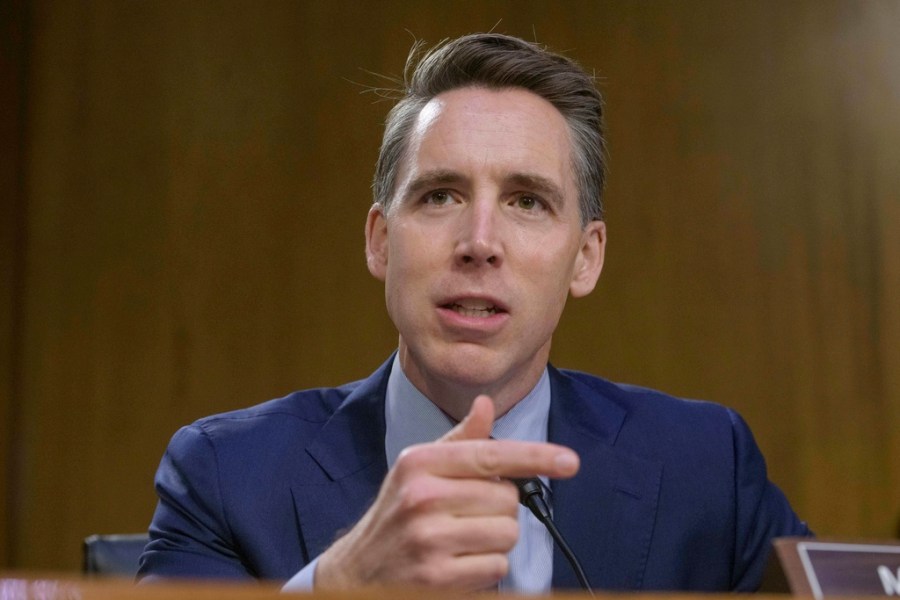Politics
Senator Hawley Proposes $20 Billion Worker Rebate Plan

Senator Josh Hawley has introduced the American Worker Rebate Act, a proposal aimed at distributing up to $20 billion in taxpayer funds to American workers. This initiative seeks to offset the economic impact of tariffs imposed during the administration of former President Donald Trump. The plan has sparked significant debate, with critics describing it as a form of income redistribution that could exacerbate the already substantial federal deficit.
The proposed legislation aims to provide financial relief to those affected by the tariffs, which have impacted various sectors, particularly manufacturing and agriculture. According to Hawley, the rebates would support workers struggling with increased costs due to these trade policies. The Senator expressed that the initiative is essential for revitalizing the American workforce, stating, “We need to ensure that our workers are not left behind as we navigate these economic challenges.”
Critics of the American Worker Rebate Act argue that it reflects a broader trend of government intervention that may lead to unintended consequences. Concerns have been raised about the potential for increased debt, with some lawmakers citing the need for fiscal responsibility. Congressional Budget Office estimates indicate that the plan could add significantly to the federal deficit, raising alarms among budget hawks.
Support and Opposition
Supporters of the plan emphasize its necessity for those most impacted by the tariffs. They argue that the rebates will not only provide immediate financial relief but also stimulate consumer spending, potentially boosting economic growth. Proponents assert that investing in American workers is crucial for the nation’s recovery, particularly in the wake of the COVID-19 pandemic.
On the other hand, opponents, including some economists and fiscal conservatives, argue that the rebates may create dependency on government aid. They warn that such measures could discourage productivity and innovation, which are vital for long-term economic stability. The debate highlights a fundamental division in American politics regarding the role of government in economic intervention.
Looking Ahead
As the proposal moves forward, it faces scrutiny in the U.S. Senate, where lawmakers will weigh its potential benefits against the risks of increased spending. The timeline for the legislation remains uncertain, with discussions expected to intensify in the coming weeks.
In a political landscape marked by polarization, the American Worker Rebate Act represents a significant test for bipartisan cooperation. Both supporters and critics will be closely monitoring its progress, as the outcome could have lasting implications for fiscal policy and the future of trade in the United States.
-

 Lifestyle3 months ago
Lifestyle3 months agoLibraries Challenge Rising E-Book Costs Amid Growing Demand
-

 Sports3 months ago
Sports3 months agoTyreek Hill Responds to Tua Tagovailoa’s Comments on Team Dynamics
-

 Sports3 months ago
Sports3 months agoLiverpool Secures Agreement to Sign Young Striker Will Wright
-

 Lifestyle3 months ago
Lifestyle3 months agoSave Your Split Tomatoes: Expert Tips for Gardeners
-

 Lifestyle3 months ago
Lifestyle3 months agoPrincess Beatrice’s Daughter Athena Joins Siblings at London Parade
-

 World3 months ago
World3 months agoWinter Storms Lash New South Wales with Snow, Flood Risks
-

 Science3 months ago
Science3 months agoTrump Administration Moves to Repeal Key Climate Regulation
-

 Science2 months ago
Science2 months agoSan Francisco Hosts Unique Contest to Identify “Performative Males”
-

 Business3 months ago
Business3 months agoSoFi Technologies Shares Slip 2% Following Insider Stock Sale
-

 Science3 months ago
Science3 months agoNew Tool Reveals Link Between Horse Coat Condition and Parasites
-

 Sports3 months ago
Sports3 months agoElon Musk Sculpture Travels From Utah to Yosemite National Park
-

 Science3 months ago
Science3 months agoNew Study Confirms Humans Transported Stonehenge Bluestones









